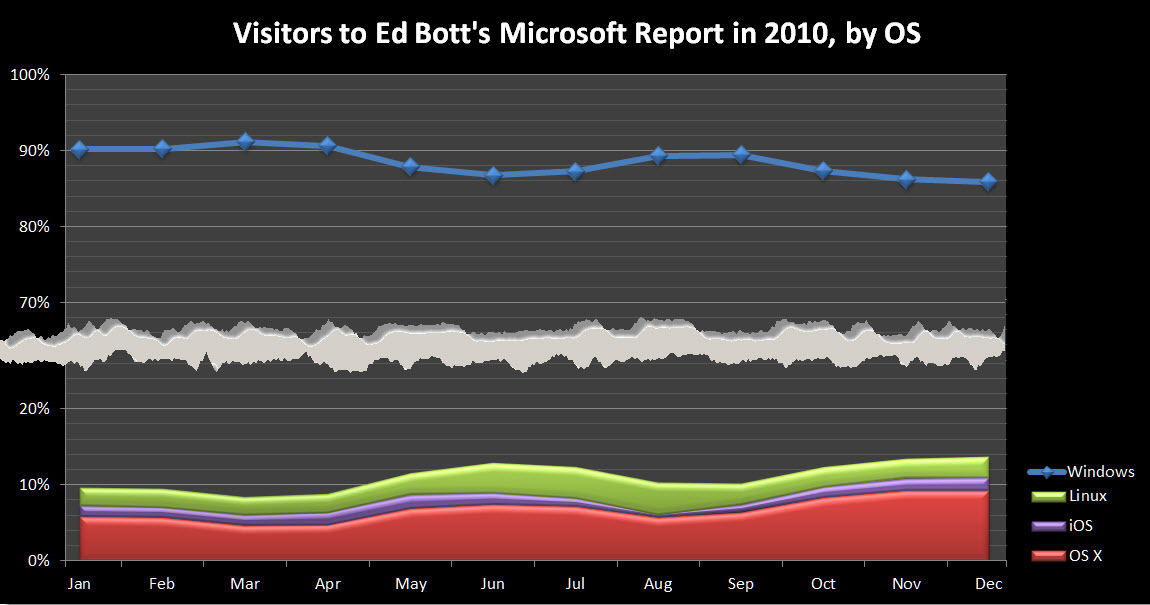The 2010 OS scorecard: Microsoft loses a little, Apple wins a lot

There's no question that Apple captured significant mindshare last year at the expense of Windows. That's due in large part to the tremendous success of the iPad and the continuing growth in popularity of the iPhone. But it also indicates Apple's ability to capture the hearts, minds, and pocketbooks of influential bloggers and media figures, who use Apple-branded computers at a share that is much greater than the world at large.
Now that 2010 is in the books, I decided to go through some analytics data to see whether Apple's mindshare also translates into greater usage of its products. The short answer is yes, and Apple's gains have come at the direct expense of Microsoft Windows.
For comparison's sake, I collected analytics data from this site (Ed Bott's Microsoft Report, not ZDNet as a whole). This collected dataset from the last 12 months represents millions of unique visits. I also gathered data from NetMarketShare.com, which publishes snapshots of PC usage based on data from 160 million visits per month to its large collection of sites (the exact methodology is here).
For previous analyses using these two data sources, see these earlier posts:
- It's official: Windows 7 is a hit, and XP is finally in decline
- When will XP finally fade away?
- Microsoft vs. Apple: Who's winning? The numbers don't lie
First, a look at the stats from this site, which I use to assess trends among tech enthusiasts, especially those currently using Windows. For the numbers in this chart, I used a three-month rolling average for each of the periods to smooth out extreme month-to-month variations and make trends more obvious. The blue line represents Windows, the colored regions below represent OS X (red), iOS (purple), and Linux (green):
A few trends jump out of this chart at me:
1. Microsoft's usage share for Windows dropped four points over the course of the year, from a solid 90% to roughly 86%. That number may be small in absolute terms, but if the trend continues it could represent the beginning of a significant decline for the Microsoft monopoly.
2. Apple's collective share for OS X and its iOS devices is up significantly, from a collected total of roughly 7% at the beginning of the year to a hair under 11% at year's end. Readership of this Windows-centric site from OS X-based Macs jumped by nearly 4 full points from the start of the year.
3. Linux usage has remained more or less constant over the course of the year, hovering under 3% for the year as a whole despite a brief bump after the release of Ubuntu Linux version 10.04 in April.
As for the larger world—the billions who don't visit tech sites regularly and whose PC budgets drive them to lower-cost Windows machines, the numbers are very different. Here's what a year's worth of data from the Operating System Market Share reports at NetMarketShare.com looks like, using the same color scheme as above:
Data provided by > Net Market Share
The noteworthy trends from this data set:
1. Microsoft's usage share for Windows dropped almost a full two points over the course of the year. Assuming this trend continues, it will drop below 90% early in 2011.
2. The usage share for OS X barely budged in 2010, actually decreasing from 5.16% at the beginning of the year to 5.02% at year's end. The real growth for Apple was in its iOS-based iPhones and iPads, which grew from 0.59% at the beginning of the year to 1.69% at year's end, with no signs of leveling off.
3. Linux remains a tiny niche worldwide, hovering around 1% usage all year long. As with the stats for my site, I noticed a spike around the launch of Ubuntu 10.04 in April. The biggest reading was 1.13% in May 2010, but none of the numbers for the last six months of the year exceeded 0.96%.
In my next post, I'll revisit the numbers for Windows 7 adoption.
[Update: In the Talkback section, several commenters asked, "Where's Android?" The answer is,"Not on the radar yet." The statistics for my ZDNet site show that Android has slowly gained in usage over the course of the year, but its numbers are still very low. The maximum usage share I recorded was 0.10% in December 2010. At Net Market Share, the pattern was similar, with Android usage going from zero at the beginning of the year to 0.38% in December. I expect these numbers to increase significantly in 2011 as more and more Android-based tablets hit the market.]
